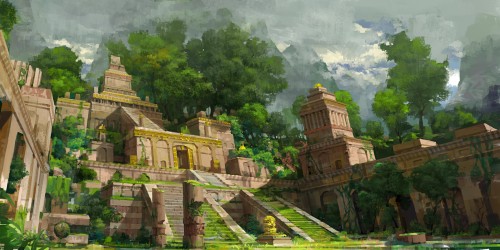
For use in a Dungeons & Dragons setting with a very low incidence of full-caster character classes. Each of the deities listed here grants any domain listed in the Players Handbook or Dungeon Master’s Guide and may have followers of any alignment.
Many temples and shrines have been built and scrupulously maintained or left as crumbling ruins over the ages. The gods of Man are commonly understood to be tremendously powerful and personal entities that take a direct interest in the lives of mortals, bringing calamity, prosperity, joy, and sorrow in varying measure. Unlike the Fiends and Fey Lords, their influence on grand-scale world events is subtle or nonexistent depending on who you ask. The gods act directly and personally, rarely affecting more than an immediate family with their interventions. They make no binding contracts with their followers, accepting or ignoring their petitions as suits their own inscrutable desires.
They walk the earth, unnoticed by most, listening to or ignoring the appeals of their faithful, accepting offerings, granting boons, and dispensing punishments themselves. Their motivations are obscure and unique to themselves. The clergy are not miracle-workers, but shrine-tenders, teachers, bureaucrats, and intellectuals. They have no more direct access to the gods than the laity, but have developed various means of reading the signs and portents the gods are known to leave for them so they may better guide the faith and appease their divine patrons.
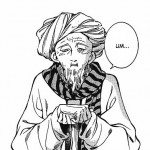 Akunbek, a very old god thought to have been a warrior long ago. When the world was young he killed the goddess of storms and the god of steel, taking their secrets and their power for himself. Now doddering in his old age, Akunbek no longer answers prayers for rain or calm seas, imparts no secrets to craftsmen, and is known as the god of rust. Common prayers to him are uttered when using metal tools, embarking on a sea voyage, sowing crops, or preparing for battle. Those that can see him describe a withered, gray-haired man with a whispy beard, tired eyes, and threadbare noble regalia. It is thought that he rarely strays from his holy places, and it is typical to see a small shrine dedicated to Akunbek in seaports and near armories.
Akunbek, a very old god thought to have been a warrior long ago. When the world was young he killed the goddess of storms and the god of steel, taking their secrets and their power for himself. Now doddering in his old age, Akunbek no longer answers prayers for rain or calm seas, imparts no secrets to craftsmen, and is known as the god of rust. Common prayers to him are uttered when using metal tools, embarking on a sea voyage, sowing crops, or preparing for battle. Those that can see him describe a withered, gray-haired man with a whispy beard, tired eyes, and threadbare noble regalia. It is thought that he rarely strays from his holy places, and it is typical to see a small shrine dedicated to Akunbek in seaports and near armories.
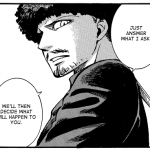 Karluk, a clever young man thought to be the most knowledgeable of the gods. There is some difference of opinion regarding his backgound. Some tales report him as the son of Mahatbek and Akunbek, others place him as the child of Sanira. It was Karluk that taught the Elves and Dwarves how to speak and invented written language. Through his gifts, useful information and gossip can spread like wildfire among mortals. Many stories of Karluk paint him as the god of fear. His faithful seek answers from him, but when he obliges they often come to regret it. He is revered by scholars, respected by the clergy generally, and his favors are often sought out by the desperate. Reports of his appearance are conflicting, with most divinely-inspired Clerics who have laid eyes on him declining to describe him. Some say his is a slight, frail man with shifty eyes and ink-stained fingers. Others report him to be a hulking brute of a man with a heavy beard calloused knuckles. It is common practice to inscribe a prayer to Karluk inside the binding of every book, making any collection of written works a shrine of sorts to him. A notable exception to this practice is the spellbooks of Eldritch Knights, Warlocks, and Wizards, who fear a prayer in such a book may provoke Karluk’s wrath.
Karluk, a clever young man thought to be the most knowledgeable of the gods. There is some difference of opinion regarding his backgound. Some tales report him as the son of Mahatbek and Akunbek, others place him as the child of Sanira. It was Karluk that taught the Elves and Dwarves how to speak and invented written language. Through his gifts, useful information and gossip can spread like wildfire among mortals. Many stories of Karluk paint him as the god of fear. His faithful seek answers from him, but when he obliges they often come to regret it. He is revered by scholars, respected by the clergy generally, and his favors are often sought out by the desperate. Reports of his appearance are conflicting, with most divinely-inspired Clerics who have laid eyes on him declining to describe him. Some say his is a slight, frail man with shifty eyes and ink-stained fingers. Others report him to be a hulking brute of a man with a heavy beard calloused knuckles. It is common practice to inscribe a prayer to Karluk inside the binding of every book, making any collection of written works a shrine of sorts to him. A notable exception to this practice is the spellbooks of Eldritch Knights, Warlocks, and Wizards, who fear a prayer in such a book may provoke Karluk’s wrath.
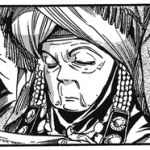 Mahatbek, a wise old woman thought to be responsible for plants and fungus of medicinal value. Also the goddess most closely associated with pestilence. Myths involving Mahatbek tend to center around barbers, witch-doctors, and midwives suffering from hubris and bringing disaster to those under their care. She is thought to punish the proud with illness. Those that have seen her report she appears as an inscrutable middle-aged woman in simple attire. Prayers to her are uttered when preparing food for winter storage, when a ship arrives from a foreign port, and when doing business with courtesans. She is thought to travel widely from place to place, and her shrines are typically found in the homes of people that are frequently in contact with the ill.
Mahatbek, a wise old woman thought to be responsible for plants and fungus of medicinal value. Also the goddess most closely associated with pestilence. Myths involving Mahatbek tend to center around barbers, witch-doctors, and midwives suffering from hubris and bringing disaster to those under their care. She is thought to punish the proud with illness. Those that have seen her report she appears as an inscrutable middle-aged woman in simple attire. Prayers to her are uttered when preparing food for winter storage, when a ship arrives from a foreign port, and when doing business with courtesans. She is thought to travel widely from place to place, and her shrines are typically found in the homes of people that are frequently in contact with the ill.
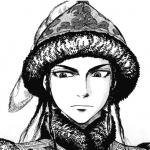 Rostem is thought to be this age’s thriving and vital warrior god. In recent times it has become increasingly clear to the clergy that he may never have been a god of strength and martial valor as originally thought, but rather a spirit of deception and lies. He is portrayed as dashing, athletic, and valiant, eager to rush headlong into battle for a worthy cause. Those that have seen him in recent years believe this image is actually Rostem’s shadow, reshaped to distract and confuse those around him. Rostem negotiates in bad faith and manipulates his followers and fellow gods continuously. Prayers are frequently offered to him in times or crisis or to bolster bravery. Increasingly the laity is accepting the notion that their warrior champion god is a liar, and many gamblers invoke him before picking up dice or cards.
Rostem is thought to be this age’s thriving and vital warrior god. In recent times it has become increasingly clear to the clergy that he may never have been a god of strength and martial valor as originally thought, but rather a spirit of deception and lies. He is portrayed as dashing, athletic, and valiant, eager to rush headlong into battle for a worthy cause. Those that have seen him in recent years believe this image is actually Rostem’s shadow, reshaped to distract and confuse those around him. Rostem negotiates in bad faith and manipulates his followers and fellow gods continuously. Prayers are frequently offered to him in times or crisis or to bolster bravery. Increasingly the laity is accepting the notion that their warrior champion god is a liar, and many gamblers invoke him before picking up dice or cards.
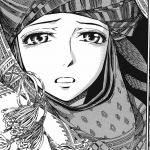 Sanira is the every-woman of the gods. Stories about her are nearly always parables of gender role expectations, with various other gods taking on the male role but Sanira always at the middle weathering abuse and doling out justice to suit the needs of the storyteller. Many of the popular tales are likely falsehoods, but she remains a cultural cornerstone. She is often thought of as the grieving mother, as any story about a fallen god places her in this role. Of all the gods she is the mostly frequently depicted in artwork, generally shown as a grey-haired matron with sad eyes and a kind smile. Prayers to Sanira are frequent, and offered to comfort her as often as to seek her help. Of all the gods, her mortal champions are the most likely to perish early in the execution of their duties. Her Clerics, when they arise, are mourned even as they live.
Sanira is the every-woman of the gods. Stories about her are nearly always parables of gender role expectations, with various other gods taking on the male role but Sanira always at the middle weathering abuse and doling out justice to suit the needs of the storyteller. Many of the popular tales are likely falsehoods, but she remains a cultural cornerstone. She is often thought of as the grieving mother, as any story about a fallen god places her in this role. Of all the gods she is the mostly frequently depicted in artwork, generally shown as a grey-haired matron with sad eyes and a kind smile. Prayers to Sanira are frequent, and offered to comfort her as often as to seek her help. Of all the gods, her mortal champions are the most likely to perish early in the execution of their duties. Her Clerics, when they arise, are mourned even as they live.
There are various other gods that appear in the folklore of the world, but these are the five most commonly venerated and the most likely to interfere with or assist mortals, and the only five thought to grant divine spellcasting. Several of the less notable gods are actually dead, victims of squabbles among themselves or even the machinations of the Archfiends or Fey. As a whole they are a fractious lot, and prominent servants of one god will often run afoul of the others.
Note that in this setting the magic used by Druids, Paladins, and Ranger are all of fiendish or fey origin. Bards, Clerics, Druids, Sorcerers, and Wizards are exceedingly uncommon, with perhaps a dozen of each alive at any given time.